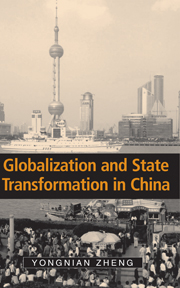Book contents
- Frontmatter
- Contents
- List of figures
- List of tables
- List of abbreviations
- Preface
- 1 Globalization: State decline or state rebuilding?
- 2 The state, leadership and globalization
- 3 Globalism, nationalism and selective importation
- 4 Power, interests, and the justification of capitalism: Constructing an interest-based political order
- 5 Bureaucratic reform and market accommodation
- 6 Building a modern economic state: Taxation, finance and enterprise system
- 7 State rebuilding, popular protest and collective action
- 8 Contending visions of the Chinese state: New Liberalism vs. the New Left
- 9 Globalization and towards a rule-based state governance?
- Notes
- Bibliography
- Index
- CAMBRIDGE ASIA-PACIFIC STUDIES
3 - Globalism, nationalism and selective importation
Published online by Cambridge University Press: 11 December 2009
- Frontmatter
- Contents
- List of figures
- List of tables
- List of abbreviations
- Preface
- 1 Globalization: State decline or state rebuilding?
- 2 The state, leadership and globalization
- 3 Globalism, nationalism and selective importation
- 4 Power, interests, and the justification of capitalism: Constructing an interest-based political order
- 5 Bureaucratic reform and market accommodation
- 6 Building a modern economic state: Taxation, finance and enterprise system
- 7 State rebuilding, popular protest and collective action
- 8 Contending visions of the Chinese state: New Liberalism vs. the New Left
- 9 Globalization and towards a rule-based state governance?
- Notes
- Bibliography
- Index
- CAMBRIDGE ASIA-PACIFIC STUDIES
Summary
Understanding the perceptions of the Chinese decision-makers is paramount if we are to understand the decision to import Western state products and to integrate the country into the world system. This chapter tries to answer the question: Why does the Chinese leadership want to import Western state products selectively? I will examine how China's leaders formed their globalist worldview over the course of the country's development, and then look at why the post-Mao leadership wants to select economic rather than political products of Western states in its efforts to transform the state.
To actively promote the process of globalization the Chinese leadership had to overcome strong social resistance. Without strong and decisive political initiatives from the top leadership, China would not have signed the trade accord with the United States that paved the way for China to join the WTO. Why did the Chinese state play such a leading role in pushing for globalization? What rationale is behind the leadership's choice to do so? I argue that behind the Chinese leaders' decision to “import” the products of Western states is a mindset or mentality, i.e., globalism. China leaders seem to have no major difficulty in reaching basic consensus on what to “import” to rebuild the state system. This chapter focuses on how this new mindset among Chinese leaders has evolved since the 1990s though it will also touch on the evolution of such a mentality in the previous eras.
- Type
- Chapter
- Information
- Globalization and State Transformation in China , pp. 39 - 59Publisher: Cambridge University PressPrint publication year: 2003

